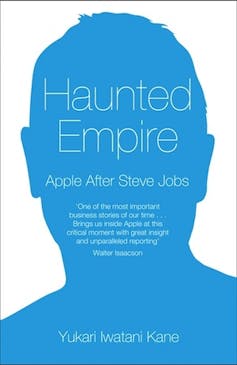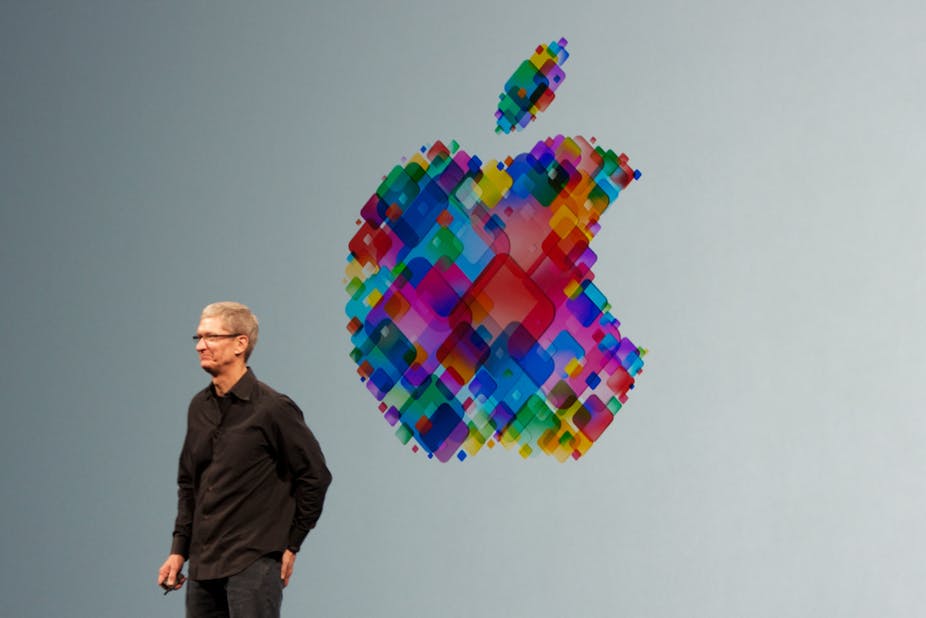The American reviews of Yukari Iwatani Kane’s book Haunted Empire: Apple After Steve Jobs have not been kind. Having covered Apple for three years as a journalist at the Wall Street Journal, Kane would have been forewarned about the difficulties of writing about Apple. Stirring the hornet’s nest even further, she called the company out for its greatest of sins, the failure to “wow” us with a new gadget.
Undeterred by the inevitable opprobrium, Kane detailed in her book, at times excessively, the characters of old and new CEOs, Steve Jobs and Tim Cook and the significant events of Apple’s recent history. These events served to illustrate the bullying, uninnovative, megalith that Apple had become under a dispassionate, colourless and ruthless leader, Tim Cook.
The book lays bare Cook’s calculating blandness in a succession of chapters on Foxconn, Apple’s trial with Samsung, the eBook price-rigging investigations, and the debacles that were Apple maps, the iPhone 4 antenna and the introduction of Siri.
Most of these events won’t be new to readers of the book, but what most won’t be aware of is the role that Cook and other Apple staff played in them. And of course throughout it all, there is that question of “what would Steve Jobs have done?”. Something that Jobs explicitly hoped people would not ask after he was gone.

All of the challenges that Apple has faced in recent years are brought together to lend weight to the question of whether Steve Jobs’ absence will be the catalyst for Apple’s slow and inevitable decline. The author also considers Apple to be a victim of the “Innovator’s Dilemma” proposed by Clayton Christensen, whereby dominant companies are superceded by more nimble companies undercutting their market or changing the market to make the dominant company’s product irrelevant. Put simply, Steve Jobs would have been able to save Apple from that fate; Tim Cook won’t.
The criticism of the book from reviewers has really centred around disagreement with that argument and the fact that nothing new is presented to back the argument up. They have also made the case that Apple’s continued growth in sales, profits and share price since Jobs’ death is evidence of a company that is actually doing very well. Certainly it is in no danger of becoming the next BlackBerry.
Farhad Manjoo from the New York Times also makes the point that because of Apple’s secrecy, it is very hard to know if it has the next paradigm shifting gadget waiting in the wings. If you had considered Apple at any time prior to the release of products like the iPhone or iPad you may have been able to level the same accusation of lack of innovation that it is being accused of now.
Needless to say, Tim Cook has dismissed the book as “nonsense”, conveniently providing reviewers with a way of summing up their thoughts on the book. It is not clear whether Tim Cook actually read the book. Given his working habits he is unlikely to have had the time and so I suspect this was a task relegated to someone in Apple’s communications department.
I don’t think the book is nonsense however because the truth is, we really don’t know if Kane is right or not. The view into Apple is so constrained by its secrecy and the threat of retribution to employees that cross that line, that drawing conclusions about a company based on financial results and even extensive interviews is always going to be impossible.
The other thing is that the idea of “wowing” the public with each product launch is grossly overstated, as Apple’s sales figures have shown. Apple’s products have always really been about evolution of their own and other’s design and function. The iPad when it came out was dismissed as being simply a bigger iPhone, which in essence it was. It now seems Apple’s tablet sales are the thing most under threat, with cheaper Android tablets cutting significantly into the iPad’s market share. Larger screened phones are also serving increasingly as a replacement for tablets, especially in Asia.
For anyone interested in Apple but also the background to the ongoing corporate battles between Apple, Google and Samsung, it is worth reading the book. There is detail that many people would not have come across and even if you have, its packaging into the book provides a good overall view of what has happened in courtrooms and factories across the world.
As for the conclusions arrived at in the book regarding Apple’s future and Cook’s role in it, as with many things currently in Apple’s lifeline, the jury is still out.
Haunted Empire: Apple After Steve Jobs by Yukari Iwatani Kane published by HarperCollins Publishers, 384 pages.
Average rating on Amazon ⅗ stars.

